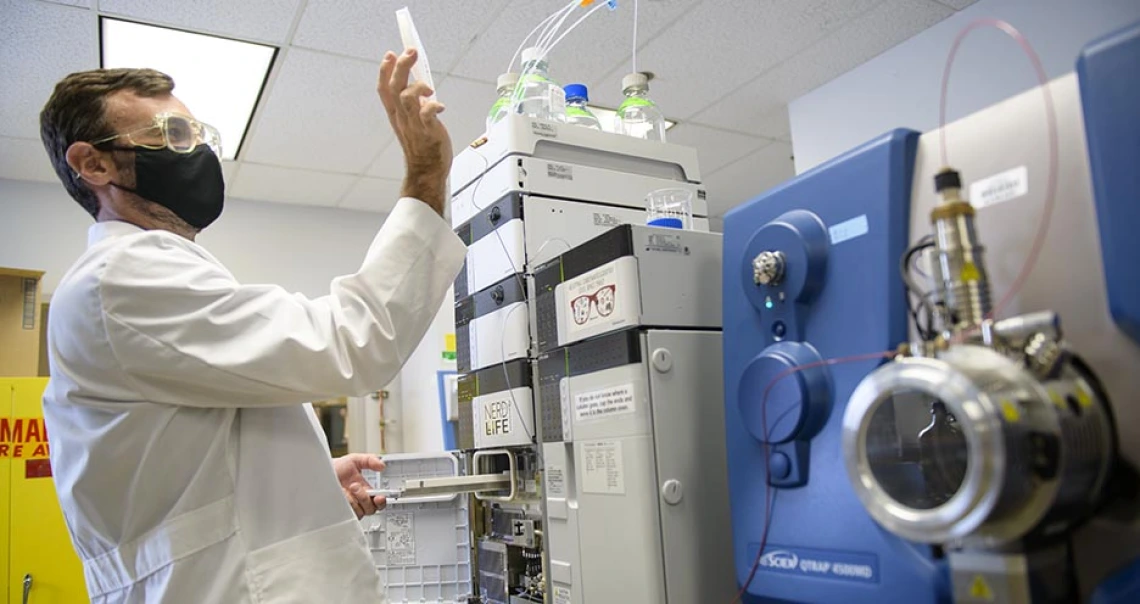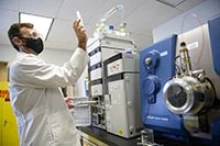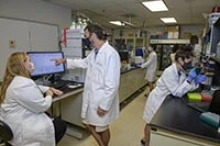Enzyme May Be Key to Unlocking Treatment for Cancer, Diabetes, UArizona Health Sciences Researcher Says
Dr. James Galligan and his University of Arizona College of Pharmacy research team found inhibiting glyoxalase-II enzyme results in slower cell growth, which may help limit disease progression.

TUCSON, Ariz. – Preliminary studies conducted by James Galligan, PhD, an assistant professor at the University of Arizona College of Pharmacy, suggest the enzyme glyoxalase II (GLO2) is a strong candidate for drug developers to consider as a potential treatment for breast cancer and diabetes.

James Galligan, PhD, looks at a sample specimen before it’s processed in his UArizona College of Pharmacy lab. (Photo: Kris Hanning/University of Arizona Health Sciences)
The enzyme plays a key role in the rate of cell growth and a therapy targeting this function may help to control the development and spread of certain diseases. Dr. Galligan, who specializes in cellular metabolism and how diseases originate, recently received a five-year $1.8 million research grant from the National Institutes of Health (NIH) to continue his investigation into this possibility.
The glyoxalase system is a set of biological compounds that accelerate chemical reactions in the body and help protect against cellular damage. The system is made up of two enzymes, glyoxalase I and glyoxalase II, both of which are found in a variety of species, including single-celled organisms, plants and mammals, suggesting the functions performed by the glyoxalase system are fundamental to biological life.

James Galligan, PhD, outside the UArizona College of Pharmacy (Photo: Kris Hanning/University of Arizona Health Sciences)
In their preliminary study, which appeared in the journal Cell Chemical Biology, Dr. Galligan’s research team demonstrated that when the function of GLO2 is inhibited, glycolysis – the process by which cells use glucose for energy – is slowed down. This results in a slower rate of cell growth, which makes GLO2 an appealing target for treatment of diseases, most notably cancer, which results from unchecked cell growth.
Cellular metabolism affects every facet of life on Earth. The process involves a complex sequence of biochemical reactions that occur in living organisms to maintain life. The disruption of this activity is the root cause of numerous diseases including many forms of cancer and diabetes.
For instance, glyoxalase is thought to play a crucial role in insulin-dependent diabetes mellitus, with expression of both forms (GLO1 and GLO2) elevated in patients who suffer from the disease. A glyoxalase connection also is suspected in breast cancer and certain urological malignancies such as prostate cancer. Related papers, with Dr. Galligan as co-author, appear in the journals ACS Chemical Biology and PNAS.

In the UArizona College of Pharmacy lab of James Galligan, PhD (standing center), where cellular metabolism is the primary area of inquiry. (Photo: Kris Hanning/University of Arizona Health Sciences)
In collaboration with researchers at the University of Colorado Anschutz Medical Campus, Dr. Galligan has identified a unique protein modification that regulates the breakdown of glucose as well as cell growth by using the GLO2 enzyme. Funded through the National Institute of General Medical Studies (NIGMS), an NIH unit, this new grant will support a research study, seeking to expand our understanding of the role of glyoxalase II in protein modification and its impact in maintaining health and causing disease.
“We aim to understand how glyoxalase II regulates cell growth and energy production in cells in the short-term,” Dr. Galligan explained. “Although the ultimate goal is to generate small-molecule therapeutics targeting glyoxalase II for the treatment of diseases such as cancer and diabetes.”
Research reported in this publication was supported by the National Institute of General Medical Sciences, a unit of the National Institutes of Health, under Award No. R35GM137910.
# # #
An article related to Dr. Galligan’s research was featured recently on the UArizona Health Sciences Connect website.
NOTE: Photos available here – https://arizona.box.com/s/5lmpx0o1err1jeqnk4y5vim8gjqqxgcd.
About the University of Arizona College of Pharmacy
The University of Arizona College of Pharmacy is the premier pharmacy college in the Southwest, and one of the top in the nation, focused on drug discovery, toxicology, pharmaceutics, health outcomes and sciences, pharmaceutical education and research through interprofessional training and collaborative public/private partnerships. Preparing pharmacists and pharmaceutical scientists in undergraduate, professional, graduate and post-doctoral programs, the college embraces an entrepreneurial spirit, providing tailored educational opportunities to broaden students' experiences. Established 72 years ago as the first health sciences college at UArizona, the college has a long history of improving science and health, both in Arizona and around the world. It is currently ranked No. 8 among the nation’s 143 colleges of pharmacy by the American Association of Colleges of Pharmacy. For more information: pharmacy.arizona.edu (Follow us: Facebook | Twitter | Instagram | YouTube).
About the University of Arizona Health Sciences
The University of Arizona Health Sciences is the statewide leader in biomedical research and health professions training. UArizona Health Sciences includes the Colleges of Medicine (Tucson and Phoenix), Nursing, Pharmacy, and the Mel and Enid Zuckerman College of Public Health, with main campus locations in Tucson and the Phoenix Biomedical Campus in downtown Phoenix. From these vantage points, Health Sciences reaches across the state of Arizona, the greater Southwest and around the world to provide next-generation education, research and outreach. A major economic engine, Health Sciences employs nearly 5,000 people, has approximately 4,000 students and 900 faculty members, and garners $200 million in research grants and contracts annually. For more information: uahs.arizona.edu (Follow us: Facebook | Twitter | YouTube | LinkedIn | Instagram).

